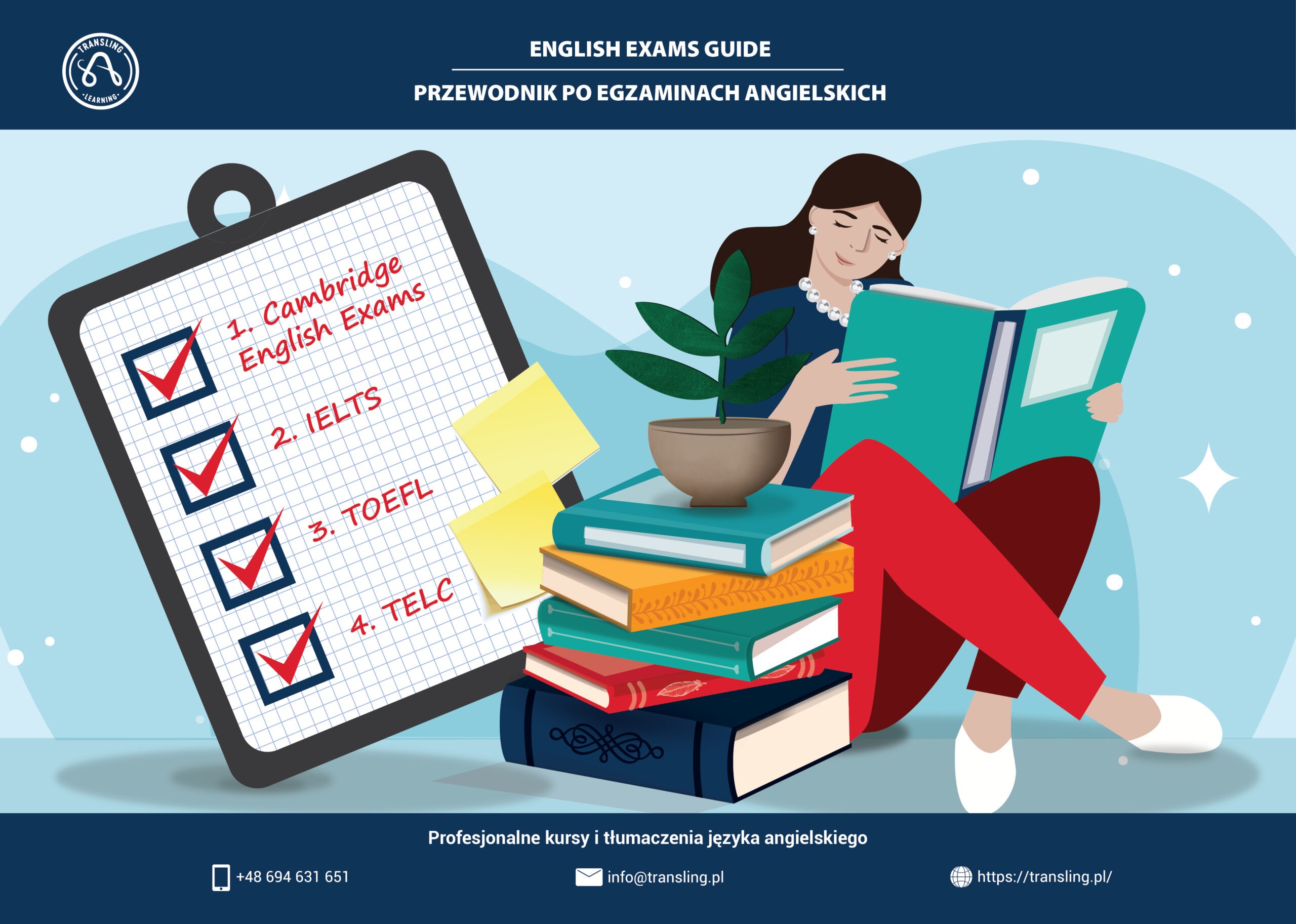Przewodnik po egzaminach angielskich
English exams guide
Nierzadko kursanci stają przed dylematem jaki egzamin wybrać, jaki certyfikat zdobyć aby zwiększyć motywację do dalszej nauki i pogłębić tym samym znajomość języka angielskiego w wymiarze holistycznym, pod kątem wszystkich umiejętności. Paleta dostępnych egzaminów jest dość bogata; wszystko zależy od naszego celu zdobycia certyfikatu poświadczającego znajomość języka na danym poziomie oraz jego uznania przez dane instytucje edukacyjne czy inne organy państwowe.
Poniżej prezentuję 4 najbardziej rozpowszechnione egzaminy z języka angielskiego o wymiarze międzynarodowym. Są to:
Cambridge English Exams
IELTS
TOEFL
TELC
Cambridge English Exams
Bez wątpienia najczęściej zdawanymi egzaminami i jednocześnie najbardziej dostępnymi oraz popularnymi są egzaminy z serii Cambridge English Exams. Egzaminy Cambridge English są znane na całym świecie i akceptowane przez uniwersytety, pracodawców i władze oświatowe w wielu krajach jako dowód spełnienia wymaganych standardów w języku angielskim. Cambridge English oferuje szeroką gamę egzaminów skierowanych do młodszych i starszych uczniów, studentów oraz dorosłych i obejmujących zastosowania ogólne i/lub akademickie, jak również biznesowe. Egzaminy Cambridge należą do najbardziej znanych na świecie kwalifikacji dla osób uczących się języka angielskiego. Każdy egzamin obejmuje cztery główne sprawności językowe – słuchanie, mówienie, czytanie i pisanie – oraz ocenia umiejętność wykorzystania różnorodnych struktur i funkcji w autentycznych sytuacjach.
General English Exams
KET (Key English Test) CEFR Level A2
Jest to egzamin, który stanowi początkowy cel nauki dla młodzieży i dorosłych, umożliwiając uczniom zaspokojenie ich podstawowych potrzeb komunikacyjnych w języku angielskim. Jest to pierwszy stopień w pięciostopniowej skali egzaminów Cambridge Main Suite.
PET (Preliminary English Test) CEFR Level B1
Jest to egzamin sprawdzający umiejętności językowe potrzebne do przetrwania w sytuacjach społecznych i zawodowych w środowisku anglojęzycznym na poziomie średnio-zaawansowanym niższym.
B2 First ( wcześniej FCE = First Certificate in English) CEFR Level B2
Jest to egzamin na poziomie średnio-zaawansowanym wyższym, wymagający kompetencji we wszystkich umiejętnościach językowych. Jest powszechnie uznawany w biznesie i przemyśle oraz przez instytucje edukacyjne w Wielkiej Brytanii i za granicą jako dowód znajomości języka na poziomie średnio-zaawansowanym B2.
C1 Advanced (wcześniej CAE = Certificate in Advanced English) CEFR Level C1
Jest to egzamin na poziomie zaawansowanym, odpowiedni dla osób, które potrzebują języka angielskiego w celach zawodowych lub na studia. Nacisk położony jest na zadania w świecie rzeczywistym. Jest również uznawany przez większość brytyjskich uniwersytetów za spełniający wymagania wstępne w zakresie języka angielskiego.
C2 Proficiency (wcześniej CPE = Certificate of Proficiency in English) CEFR Level C2
Jest to egzamin na najwyższym poziomie zaawansowania, potwierdzający pełną biegłość w języku angielskim; jest on uznawany przez brytyjskie uniwersytety za spełniający wymagania języka angielskiego oraz do celów biznesowych i akademickich za granicą.
Komponenty i czas trwania egzaminu
Poziom B2
CZYTANIE (Reading and Use of English) 7 zadań – 75 min
PISANIE (Writing) 2 zadania – 80 min
SŁUCHANIE (Listening) 4 zadania – ok. 40 min
MÓWIENIE (Speaking) 4 zadania – ok. 14 minut na parę kandydatów (ta część egzaminu zdawana jest z innym kandydatem)
Poziom C1
CZYTANIE (Reading and Use of English) 8 zadań – 90 min
PISANIE (Writing) 2 zadania – 90 min
SŁUCHANIE (Listening) 4 zadania – ok. 40 min
MÓWIENIE (Speaking) 4 zadania – 15 minut na parę kandydatów (ta część egzaminu zdawana jest z innym kandydatem)
CZYTANIE (Reading and Use of English) 7 zadań– 90 min
PISANIE (Writing) 2 zadania – 90 min
SŁUCHANIE (Listening) 4 zadania – ok. 40 min
MÓWIENIE (Speaking) 3 zadania – 16 minut na parę kandydatów (ta część egzaminu zdawana jest z innym kandydatem)
Format
Format egzaminu jest taki sam zarówno w wersji papierowej jak i komputerowej.
Egzaminy Cambridge składają się z czterech różnych części na poziomach B2, C1 oraz C2.
Poniżej format egzaminu C1:
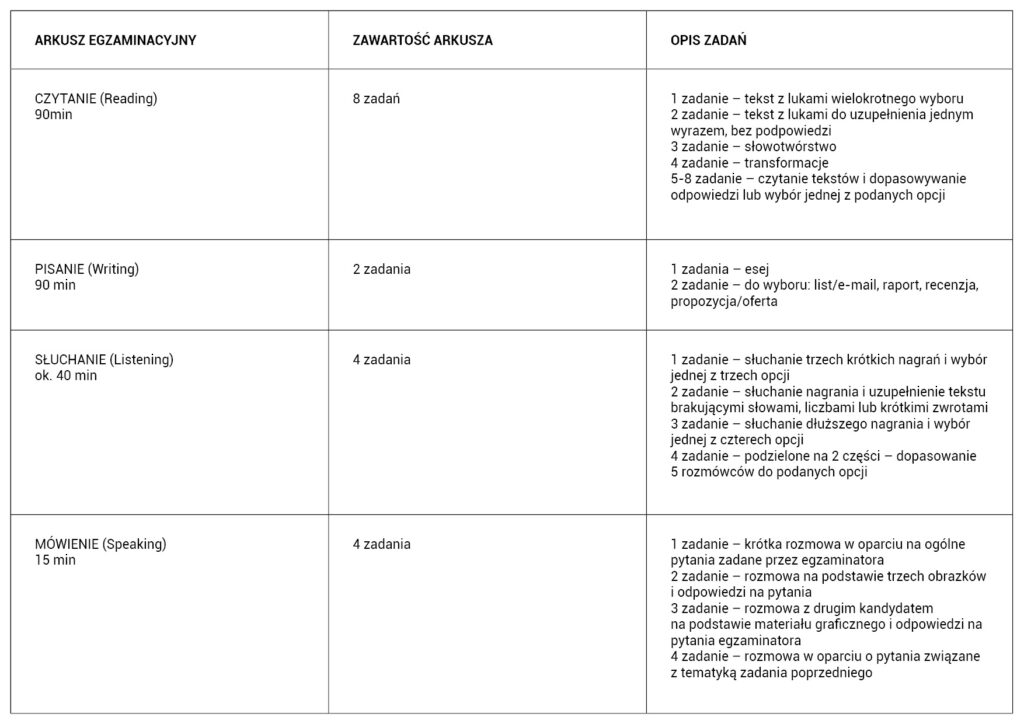
Punktacja
Każda sekcja testu jest oceniana niezależnie, a następnie z każdej sekcji obliczana jest średnia, co daje ogólny wynik. Na przykład aby osiągnąć poziom C1, należy uzyskać wynik w przedziale od 180 do 200. Aby osiągnąć poziom C2, wymagany wynik to 200-230.
Wynik zdany
Nie ma standardowego wyniku zaliczającego C1 i C2. Każda instytucja ustala wynik, który zdający muszą osiągnąć, aby uzyskać zaliczenie egzaminu. Aby otrzymać certyfikat na poziomie C1, należy uzyskać co najmniej 180 punktów, a na poziomie C2 – 200.
Business English Certificates (BEC) CEFR Levels B1- C1
Są to uznane na arenie międzynarodowej kwalifikacje, które pokazują pracodawcom umiejętności posługiwania się językiem angielskim w miejscu pracy i środowisku biznesowym. Istnieją trzy różne poziomy:
B1 Business Preliminary
B2 Business Vantage
C1 Business Higher
Certyfikat C1 Business Higher potwierdza, że potrafimy
skutecznie komunikować się na poziomie menedżerskim i zawodowym
uczestniczyć w spotkaniach biznesowych w miejscu pracy, na seminariach oraz szkoleniach
wypowiadać się po angielsku i reagować z dużą płynnością w środowisku biznesowym i społecznym
Format egzaminu na poziomie C1:
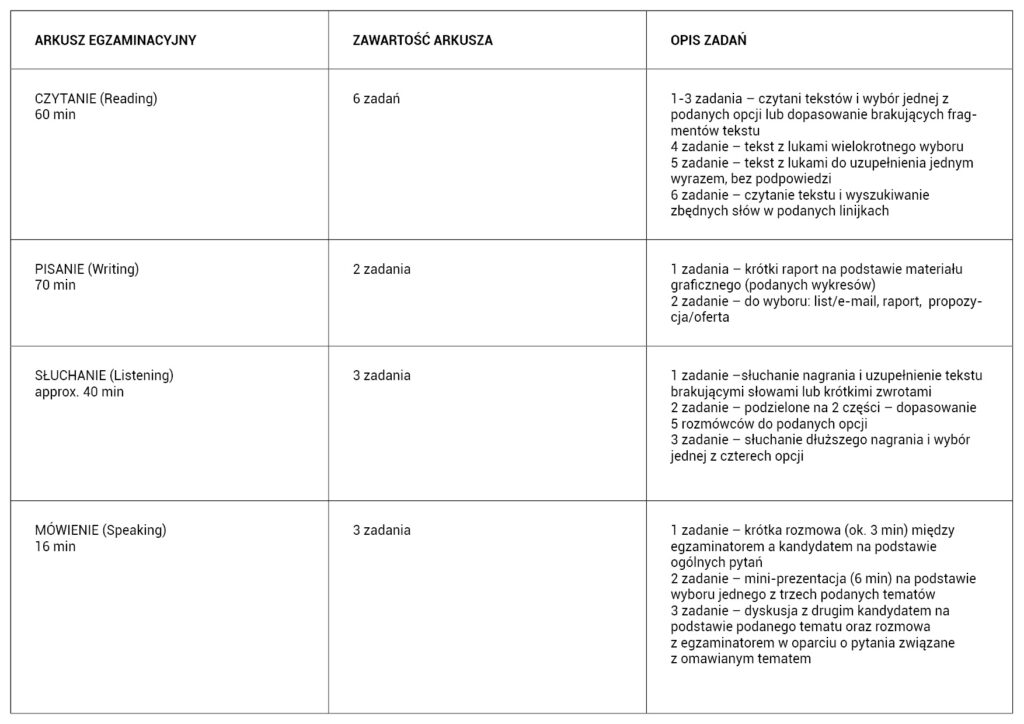
Young Learners English
YLE (Young Learners English) CEFR Levels Below A1 – A2
YLE sprawdza, jak dobrze dziecko radzi sobie z umiejętnościami słuchania, mówienia, czytania i pisania. Testy mają na celu sprawić, że nauka będzie przyjemnością. Istnieją trzy różne poziomy: Starters, Movers, Flyers.
Wyniki egzaminów w wersji papierowej są dostępne w ciągu 6-9 tygodni a w wersji komputerowej po około 3 tygodni od dnia egzaminu. Certyfikaty Cambridge są ważne bezterminowo. Egzaminy przeprowadzają licencjonowane centra egzaminacyjne a instytucją nadzorującą i organizującą egzaminy jest British Council.
IELTS (International English Language Testing System)
IELTS sprawdza pełny zakres umiejętności posługiwania się językiem angielskim, z którymi uczniowie zwykle spotykają się podczas nauki w języku angielskim. Wszyscy kandydaci biorą udział w tych samych modułach słuchania i mówienia. Dostępna jest opcja modułów Academic lub General Training w zakresie czytania i pisania. Akademicki moduł jest odpowiedni dla kandydatów planujących podjęcie studiów wyższych. Natomiast General Training jest odpowiedni dla kandydatów planujących podjęcie szkolenia pozaakademickiego lub doświadczenia zawodowego, lub w celach imigracyjnych. IELTS jest akceptowany przez większość australijskich, brytyjskich, kanadyjskich, nowozelandzkich i coraz częściej amerykańskich instytucji akademickich do celów rekrutacji. Wymagana ocena zależy od konkretnej instytucji. IELTS jest także akceptowany przez wiele organizacji zawodowych i rządowych.
Czas trwania egzaminu:
Listening – 30 mins
Academic Reading – 60 mins
General reading – 60 mins
Academic writing – 60 mins
General writing – 60 mins
Speaking – 11-14 mins
Format egzaminu IELTS Academic
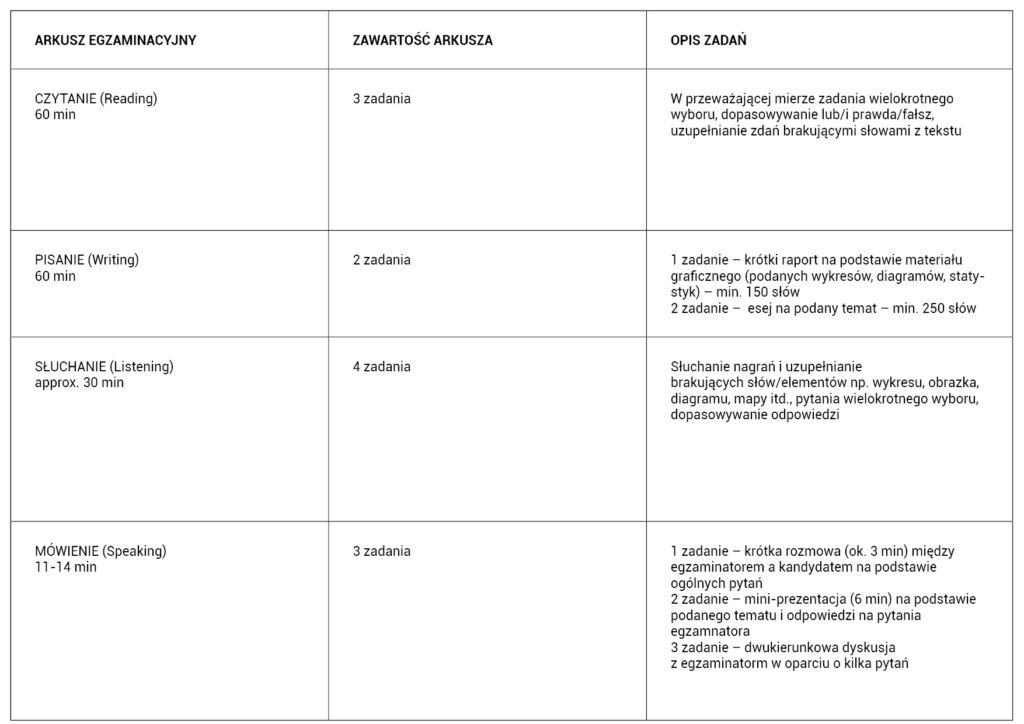
Punktacja
Za każdą sekcję testu zdający otrzymuje wynik 1-9 (1 oznacza niski). Wyniki z różnych części testu stanowią średnią wyniku ogólnego.
Zdany wynik
Nie ma standardowego wyniku egzaminu IELTS. Każda instytucja ustala wynik, który studenci muszą osiągnąć, aby zostać przyjętym. Jednak minimalny wynik wymagany przez większość uniwersytetów to 6,5.
Wynik testu IELTS jest ważny bezterminowo, natomiast w przypadku, gdy wykorzystywany jest do celów rekrutacyjnych na zagraniczne uczelnie lub do wniosków wizowych, zwykle nie powinien być starszy niż dwa lata.
TOEFL Test of English as a Foreign Language
Test of English as a Foreign Language to egzamin opracowany przez ETS, który mierzy zdolność osób, dla których angielski nie jest językiem ojczystym, do funkcjonowania w środowisku akademickim. Wiele szkół wyższych i uniwersytetów, szczególnie w Stanach Zjednoczonych, wymaga od studentów języka ESL przedstawienia wyniku TOEFL, zanim będą mogli ubiegać się o udział w programie. Test ocenia umiejętności słuchania, czytania, pisania i mówienia. TOEFL nie jest przeznaczony dla początkujących lecz dla osób już zaawansowanych, którzy są gotowi udowodnić, że potrafią żyć i studiować w środowisku angielskim.
Podobnie jak wszystkie inne egzaminy, TOEFL również składa się z czterech części: czytania, słuchania, mówienia i pisania.
Format
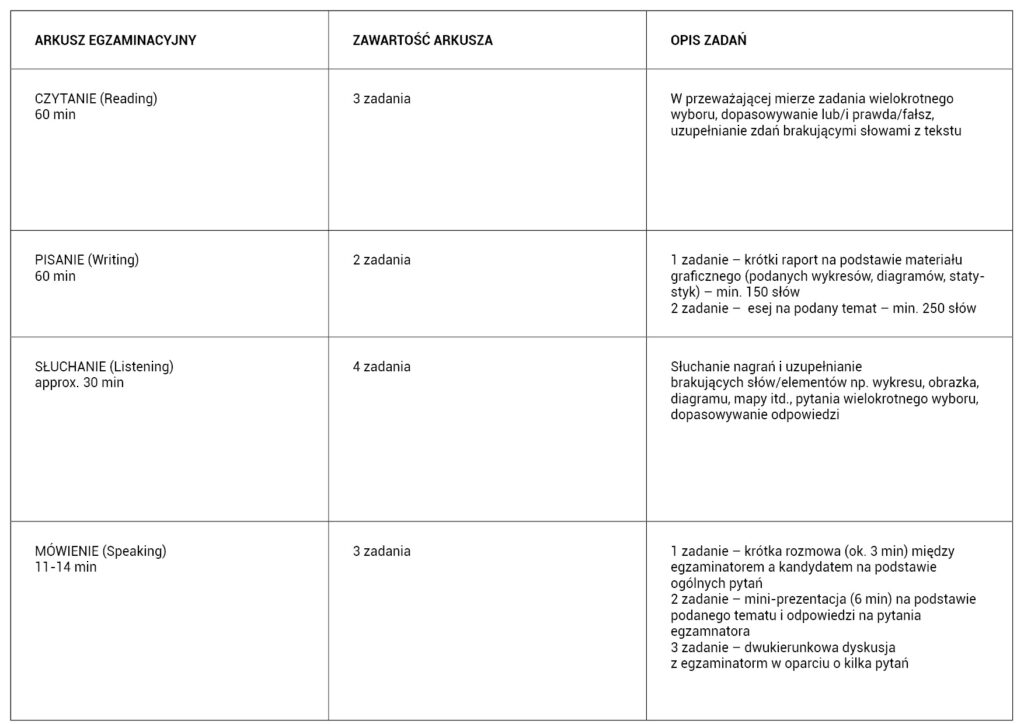
Punktacja
Każda sekcja egzaminu TOEFL jest warta maksymalnie 30 punktów. Całkowity wynik to suma wyników z czterech sekcji, czyli 120. Wynik ten jest następnie konwertowany do skali 0–100.
Wynik pozytywny
Nie ma standardowego wyniku egzaminu TOEFL. Każda instytucja ustala wynik, który zdający muszą osiągnąć, aby zostać przyjętym. Ogólnie rzecz biorąc, im trudniej jest zostać przyjętym na uniwersytet, tym wyższych spodziewają się wyników TOEFL. Niektóre uniwersytety wymagają 100 lub więcej, a inne przyjmują kandydatów z wynikami 60-70.
Egzaminy TEOFL są ważne 2 lata od wydania certyfikatu
TELC The European Language Certificates
TELC – The European Language Certificates – z siedzibą we Frankfurcie nad Menem to system egzaminacyjny oparty na Europejskim Systemie Opisu Kształcenia Językowego. Telc został opracowany i jest zarządzany przez organizację non-profit WBT (Weiterbildungs-Testsysteme GmbH – później telc GmbH), która jest członkiem ALTE – Association of European Language Certification Organisations – oraz wraz z innymi prestiżowymi organizacjami, takimi jak Goethe Institute, University of Cambridge ESOL Examinations czyli Alliance Française wyznacza standardy najlepszych egzaminów językowych w Europie. Certyfikat TELC można uzyskać po zdaniu egzaminu sprawdzającego umiejętności językowe, ze szczególnym uwzględnieniem umiejętności komunikacyjnych. To, co odróżnia egzaminy TELC od innych egzaminów, to ich porównywalność. Oznacza to, że egzamin zdany m.in.z języka angielskiego na poziomie B2 (poziom średnio-zaawansowany wyższy) jest równoznaczny z egzaminem B2 zdawanym z języka francuskiego lub niemieckiego na tym samym poziomie. Porównywalność tę osiąga się dzięki temu, że certyfikaty językowe w systemie TELC są identyczne dla wszystkich języków oferowanych w systemie, a zasady egzaminowania są wspólne dla wszystkich krajów uczestniczących w tym programie. Dzięki temu ocena na certyfikacie jest również porównywalna. Kolejną ważną cechą certyfikatów TELC jest ich szczególny nacisk na rozwój umiejętności komunikacyjnych niezbędnych zarówno w kontaktach prywatnych, jak i zawodowych. Egzaminy TELC dają możliwość sprawdzenia znajomości nie tylko języka ogólnego, ale także języków akademickich, biznesowych i technicznych.
Potwierdzenie znajomości języka obcego rozpoznawalnym i uznawanym certyfikatem otwiera wiele dróg, np. do objęcia zawodu nauczyciela, stanowiska urzędnika w instytucji unijnej czy w służbie cywilnej, przewodnika turystycznego bądź pilota wycieczek.
Każdy z egzaminów TELC jest przygotowany na podstawie skali poziomów biegłości językowej ujętej w Europejskim Systemie Opisu Kształcenia Językowego (CEFR, The Common European Framework of Reference for Languages) Rady Europy A1-B2. Dodatkowo z języka angielskiego i niemieckiego egzamin można zdawać na poziomie C1 i C2.
Egzaminy TELC testują kompetencje językowe przede wszystkim w sytuacjach praktycznych. W odróżnieniu od egzaminów Cambridge (B2 First, C1 Advanced, C2 Proficiency) skupiają się na podstawowych dziedzinach życia i umiejętności komunikacji w sytuacjach codziennych – jak np. rezerwacja lotu lub pokoju w hotelu, rozmowy prywatne i zawodowe czy korzystanie z przestrzeni publicznej i usług albo załatwianie spraw urzędowych. Dzięki temu zyskały opinię nieco łatwiejszych od innych innych egzaminów np. Cambridge.
Podobnie jak w przypadku poprzednich egzaminów, również na egzaminach TELC realizowane są cztery moduły: czytanie, słuchanie, pisanie i mówienie.
Format egzaminu TELC napoziomie B2
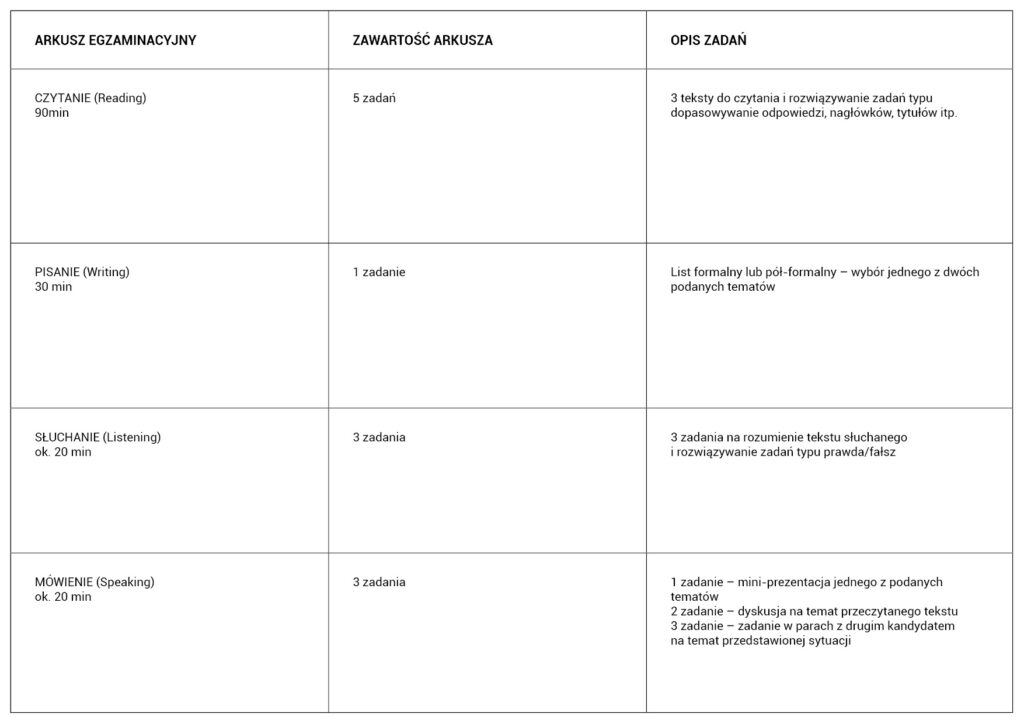
Punktacja
Egzamin ustny i pisemny odbywają się zwykle w tym samym dniu. Test trwa około 160-170 minut, a maksymalnie można uzyskać 300 punktów: 225 z części pisemnej i 75 z ustnej. Wyniki są dostępne po około 4-6 tygodniach. Certyfikaty TELC są ważne bezterminowo (podobnie jak egzaminy Cambridge).
Część pisemna egzaminu jest sprawdzana w Centralnym Biurze Egzaminacyjnym we Frankfurcie nad Menem. Wypowiedź pisemna jest oceniana dwustopniowo, przez dwóch różnych uprawnionych egzaminatorów. Część ustną ocenia się już w instytucjach przeprowadzających egzamin a zajmują się tym licencjonowani egzaminatorzy.
PODSUMOWANIE
Jak pokazuje powyższe zestawienie wiodących egzaminów języka angielskiego, nie ważne jaki egzamin wybierzemy to format egzaminu jest podobny, bowiem testowane są wszystkie 4 kompetencje językowe jak czytanie, pisanie, słuchanie i mówienie różniące się jedynie typami zadań i strategiami, które należy opanować aby zdać pomyślnie dany egzamin.
Przy wyborze właściwego dla nas egzaminu i certyfikatu dobrze jest zapoznać się ze standardami, użytecznością oraz uznaniem dokumentu przez właściwe instytucje. Jeśli przystępujemy do egzaminu aby zaspokoić jedynie własne ambicje i aspiracje, dobrą opcją wydają się być egzaminy Cambridge lub TELC jako, że tematyka jest bardziej ogólna w przeciwieństwie do IELTS czy TEOFL, które nacechowane są raczej kontekstem naukowym i akademickim. Kolejną zaleta podejścia do egzaminów Cambridge lub TELC jest bezterminowość certyfikatów, bowiem nie ma terminu ważności dokumentów. Czas oczekiwania na wynik egzaminu jest również zbliżony.
English exam guide
Students often face the dilemma of which exam to choose and which certificate to obtain to increase their motivation to continue learning and thus deepen their knowledge of English in a holistic dimension, in terms of all skills. The range of available exams is quite broad; everything depends on our goal to obtain a certificate confirming knowledge of the language at a given level and its recognition by educational institutions or other national entities.
Let’s have a closer look at four most popular international English exams:
Cambridge English Exams
IELTS
TOEFL
TELC
Cambridge English examinations are known all over the world and are accepted by universities, employers and education authorities in many countries as evidence of the required standards in English. Cambridge English has a wide range of examinations for learners, covering general and/or academic use, business use and young learners. The Cambridge English examinations are amongst the world’s best known qualifications for learners of English. Each examination covers the four main language skills – listening, speaking, reading and writing – and assesses the ability to use a variety of structures and functions in authentic situations. Assessment of Cambridge examinations is linked to the Common European Framework.
Cambridge English Exams
KET (Key English Test) CEF Level A2
This is an examination that provides an initial learning objective for adolescents and adults, enabling learners to meet their basic communication needs in English. It is the first step on the ladder of the five level Cambridge Main Suite examinations.
PET (Preliminary English Test) CEF Level B1
This is an examination that tests the language skills needed to survive in social and work situations in an English-speaking environment.
FCE (First Certificate in English) CEF Level B2
This is an examination at an intermediate level that requires competence in all the language skills. It is widely recognised in commerce and industry, and by educational institutions in Britain and overseas as proof of language ability at an intermediate level.
CAE (Certificate in Advanced English) CEF Level C1
This is an examination at an advanced level that is suitable for people who require English for professional or study purposes. There is an emphasis on real-world tasks. It is also recognised by the majority of British universities as fulfilling English Language entrance requirements.
CPE (Certificate of Proficiency in English) CEF Level C2
This is an examination at an advanced level that is recognised as fulfilling English language requirements by British universities and for business and academic purposes overseas.
Reading and Use of English – 1 hour 30 minutes
Writing – 1 hour 30 minutes
Listening – Around 40 minutes
Speaking – 15 minutes per pair of candidates (you complete this part of the test with another candidate)
Reading and Use of English – 1 hour 30 minutes
Writing – 1 hour 30 minutes
Listening – Around 40 minutes
Speaking – 16 minutes per pair of candidates (you complete this part of the test with another candidate)
The C1 exam comprises four papers: Reading and Use of English, Writing, Speaking, and Listening. The C2 exam is the same as the C1 exam but with a higher level of difficulty.
Passing these exams shows you can use English at a level equivalent to native speakers. Passing just the C1 exam will give you a ‘Certificate in Advanced English (CAE).’ Passing the C2 exam gives you a ‘Certificate of Proficiency in English (CPE).’
These tests are comprised of four different papers:
Reading and Use of English: This paper tests your ability to read and understand complex texts, as well as your ability to use grammar correctly. There are seven parts to this paper, each with a different focus.
Writing: This paper tests your ability to write clear, well-structured texts. There are two parts to this paper. In Part 1, you must write an essay responding to a point of view, argument, or problem. In Part 2, you must write a text in a specific genre (such as a letter, report, or review).
Speaking: This paper tests your ability to communicate effectively in English. There are four parts to this paper. In Part 1, you will converse about yourself and your daily life with the examiner. In Part 2, you will speak with the examiner about a topic. In Part 3, you will discuss a topic with the examiner. In Part 4, you will give a short talk to the examiner.
Listening: This paper tests your ability to understand spoken English. There are four parts to this paper. In Part 1, you will listen to a conversation and answer questions. In Part 2, you will listen to a monologue and answer questions. In Part 3, you will listen to a conversation and answer questions. In Part 4, you will listen to a talk and answer questions.
Each test section is scored independently, and then an average is taken across each section to give you an overall score. To achieve a C1 level, you must score between 180 and 200. To achieve C2, the required score is 200-230.
There is no standard pass score for C1 and C2. Each institution sets the score that students must achieve to gain admission. However, you must score at least 180 to be awarded a C1 level certificate and 200 for C2.
Professional English Exams
BEC (Business English Certificates) CEF Levels B1 to C1
These are internationally recognised qualifications that show employers a person’s skills for using English in the workplace. There are three different levels: BEC Preliminary, BEC Vantage, BEC Higher
Young Learners English
YLE (Young Learners English) CEF Levels Below A1 to A2
YLE measures how well a child is doing in the skills of listening, speaking and reading and writing. The tests are designed to make learning fun. There are three different levels: Starters, Movers, Flyers
IELTS (International English Language Testing System)
IELTS tests the complete range of English language skills that students usually encounter when studying or training in the medium of English. All candidates take the same Listening and Speaking Modules. There is an option of either Academic or General Training Reading and Writing Modules. Academic is suitable for candidates planning to undertake higher education study. General Training is suitable for candidates planning to undertake non-academic training or work experience, or for immigration purposes.
IELTS is accepted by most Australian, British, Canadian, New Zealand and increasingly American academic institutions for admissions purposes. The grade required depends on the particular institution. IELTS is also accepted by many professional and governmental organisations.
IELTS covers six levels, aligned with the Common European Framework.
- Listening – 30 mins
- Reading – 60 mins
- Training reading – 60 mins
- Academic writing – 60 mins
- Training writing – 60 mins
- Speaking – 11-14 mins
There are two versions of the IELTS exam, General Training, and Academic. The academic test judges your English level concerning education and whether you are ready to study at a specific university, for example.
The IELTS General Training exam covers a broader range of topics. It is designed to test your English level for everyday situations, including work.
Both tests are designed to assess your ability to communicate in English in all four skills: listening, reading, writing, and speaking. The test is administered face-to-face, with one to two trained testers.
You are given a score of 1-9 for each test section (1 being low). Your scores for the different sections of the test work out as an average for an overall score.
There is no standard pass score for IELTS. Each institution sets the score that students must achieve to gain admission. However, the minimum score required by most universities is 6.5.
TOEFL Test of English as a Foreign Language
The Test of English as a Foreign Language is an exam developed by ETS that measures the ability of non-native English speakers to function in an academic setting. Many colleges and universities, especially in the United States, require ESL students to submit a TOEFL score before they can apply to a program. The test evaluates listening, reading, writing, and speaking skills. The TOEFL is not for beginner ESL students. It is designed for advanced learners who are ready to prove that they have the ability to live and study in an English environment. It is important that you familiarize yourself with the test that you will be taking. The majority of test centers are now using the Internet Based TOEFL (iBT). Before beginning the following practice pages, check with your local test center to confirm that the iBT is available in your region.
Paper-Based TOEFL (PBT)
In areas where the Internet-Based TOEFL (see below) is not available, the Paper-Based TOEFL is used. The total time you will spend taking the paper-based test is 2.5 hours.
Internet-Based TOEFL (iBT)
The TOEFL iBT is intended to replace previous versions of the test. It is gradually becoming available worldwide. Changes include the elimination of the structure section, and the addition of the speaking and writing section. Integrated tasks that require the test taker to combine more than one skill have also been added. Some stylistic changes related to language have also been made in order to make the spoken exchanges as realistic as possible. The aim of the TOEFL remains the same as it has in previous forms. A TOEFL iBT score measures the communication skills of those who wish to enter a post-secondary educational facility where English is the native language.
Here is the format of the TOEFL, showing the differences between the paper-based, and internet-based versions. The TWE is required for all PBT takers. An optional TSE (Test of Spoken English) is available for PBT takers who require a Speaking score. Please note, the practice session that follows is based on the NEW internet-based TOEFL (iBT) as the previous versions are being discontinued.
TOEFL Format
Paper-based Test (PBT)
Listening
30 minutes
Part A: Short dialogues
Part B: Long conversations
Part C: Mini-lectures
Structure & Written Expression
25 minutes
Sentence completion (15 questions)
Error recognition (25 questions)
Reading
55 minutes
(50 questions – approx. 5 passages)
Writing TWE (Test of Written English)
30 Minutes
1 essay topic
Internet-based Test (iBT)
Reading
60-100 minutes
3-5 passages (12-14 questions each)
Listening
60-90 minutes
4-6 lectures and academic discussions (6 questions each)
2-3 conversations (5 questions each)
Speaking
20 minutes
6 tasks (2 independent, 4 integrated)
Writing
50 minutes
1 integrated task, 1 independent task
Around 3 hours
The TOEFL comprises four sections: Reading, Listening, Speaking, and Writing.
The Reading section consists of three or four passages, each followed by five questions. The passages are on academic topics; they are the kind of material that might be found in an undergraduate university textbook. The questions require reading skills such as skimming, scanning, and drawing inferences from the text.
The Listening section consists of six or seven passages, each followed by five questions. The passages are on academic topics; they are the kind of material that you might find in a lecture at an undergraduate university. The questions require listening skills such as identifying main ideas, understanding detail, and drawing inferences from the speech.
The TOEFL Speaking section consists of six tasks: two independent tasks and four integrated tasks. In the two independent tasks, the test taker speaks on a familiar topic for one to two minutes. In the four integrated tasks, the test taker reads, listens, and then speaks in response to a question. The Speaking section measures the ability to communicate in English in an academic setting.
The Writing section consists of two tasks: an integrated task and an independent task. In the integrated task, the test taker reads a passage and then listens to a lecture on the same topic. The test taker then writes a summary of the lecture. In the independent task, the test taker writes an essay on a familiar topic. The Writing section measures the ability to write in English in an academic setting.
Each section of the TOEFL is worth a maximum of 30 points. The total score is the sum of the scores from the four sections, 120. This is then converted to a scale of 0–100.
There is no standard pass score for TOEFL. Each institution sets the score that students must achieve to gain admission. Generally, the harder it is to get accepted to a university, the higher the TOEFL scores they expect. Some universities ask for 100 or more, and others take scores in the 60s and 70s.
TELC The European Language Certificates
Telc The European Language Certificates – is an examination system based on the Common European Framework of Reference for Languages: learning, teaching, assessment of the Council of Europe.
Telc was developed and is administered by non-profit organization WBT (Weiterbildungs-Testsysteme GmbH – later telc GmbH) which is a member of ALTE – Association of European Language Certification Organizations – and together with other prestigious organizations such as Goethe Institute, University of Cambridge ESOL Examinations or Alliance Française sets the standards for the best language exams in Europe.
Telc certificate can be obtained after passing an exam which tests language skills, with particular emphasis on communication skills.
What distinguishes telc exams from other exams is their comparability. This means that an exam passed e.g. in English at B2 (higher intermediate level) is the same as a B2 exam passed in French or German at the same level. This comparability is achieved due to the fact that the language certificates in the telc system are identical for all the languages offered in the system, and the examination rules are common for all the countries participating in this programme. This makes the grade on the certificate also comparable. Another important feature of telc certificates is their specific focus on developing communication skills necessary in both private and professional contacts. Telc exams give an opportunity to check one’s knowledge of not only general language, but also academic, business and technical languages.
SUMMARY
As the above compilation and presentation of leading English language exams shows, no matter which exam we choose, the exam format is similar, because all 4 language competencies are tested, such as reading, writing, listening and speaking, differing only in the types of tasks and strategies that must be mastered to successfully pass a given exam. When choosing the right exam and certificate for us, it is good to familiarise ourselves with the standards, usability and recognition of the document by relevant institutions. If we take the exam to satisfy only our own ambitions and aspirations, Cambridge or TELC exams seem to be a good option as the topics are more general, unlike IELTS or TEOFL, which are characterised by a scientific and academic context. Another advantage of taking Cambridge or TELC exams is the indefinite validity of the certificates, as there is no expiry date for the documents. The waiting time for the exam result is also similar.
